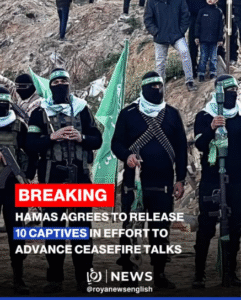Hamas has agreed to release 10 captives as part of a renewed push to advance stalled ceasefire negotiations with Israel, according to officials familiar with the ongoing talks. The decision is seen as a significant gesture by the militant group, aimed at reviving diplomatic momentum in efforts to bring an end to months of deadly conflict in Gaza.
The hostages, reportedly civilians including several women and elderly individuals, have been held in Gaza since the October 7 attack that triggered the war. Their planned release is expected to take place in stages, under the supervision of international mediators, including Egypt and Qatar. The move is being interpreted as a signal that Hamas is willing to show flexibility in exchange for broader concessions, including a temporary halt in Israeli military operations and improved humanitarian access to the besieged enclave.
A senior Hamas official, speaking on condition of anonymity, said the release is intended to demonstrate the group’s “seriousness” about reaching a long-term ceasefire. “This is a humanitarian step and a message to all parties that Hamas wants an end to the suffering of our people,” the official stated. The group has reportedly linked the release to guarantees of increased aid deliveries, including fuel, medicine, and food for civilians in Gaza, where the humanitarian situation has reached critical levels.
Israeli officials have not publicly commented on the reported deal but have previously maintained that any release of hostages must be accompanied by strict security assurances and progress toward a sustainable ceasefire. According to sources close to the Israeli security cabinet, the government is weighing its response carefully, wary of repeating past mistakes but under increasing pressure from families of captives and international allies to secure their safe return.
The United States has also been involved in the renewed diplomatic push, with Secretary of State Antony Blinken reportedly urging both sides to make tangible gestures to facilitate a broader ceasefire. The White House praised the possible release as a “positive development” and emphasized that humanitarian considerations must remain central to the ongoing talks. President Biden is said to be personally briefed on the situation and supportive of continued U.S. mediation efforts.
So far, negotiations have been bogged down by disagreements over the sequencing of prisoner exchanges, the length of any proposed ceasefire, and guarantees regarding the withdrawal of Israeli troops from Gaza. Hamas insists on a full Israeli withdrawal as a condition for a permanent truce, while Israel remains firm that Hamas must first release all hostages and disarm its military wing.
The conflict has killed tens of thousands of Palestinians and over a thousand Israelis, according to local and international estimates, with entire neighborhoods in Gaza reduced to rubble. Aid agencies have warned that Gaza is on the brink of total collapse, with water, electricity, and food supplies critically low and medical facilities overwhelmed. The United Nations has repeatedly called for an immediate ceasefire to allow for the protection of civilians and the rebuilding of essential infrastructure.
The planned release of the 10 hostages comes amid increasing international criticism of the prolonged conflict and growing calls for a political solution. European and Arab nations have intensified their diplomatic engagement, pushing for a phased de-escalation that would include a prisoner swap, an extended ceasefire, and ultimately a framework for a two-state solution. These efforts have been complicated by deep mistrust between the parties and the fractured political landscape in both Israel and the Palestinian territories.
Analysts caution that while the release of the captives could provide a much-needed breakthrough, it is far from a guarantee of lasting peace. “It’s a step in the right direction, but we’ve seen gestures before that led nowhere,” said a Middle East conflict expert. “The key will be whether both sides are truly willing to make the painful compromises necessary to end the cycle of violence.”
For now, families of the hostages and civilians on both sides wait anxiously, hoping the release marks the beginning of a meaningful path toward peace, rather than another fleeting moment of progress in a decades-long conflict.


